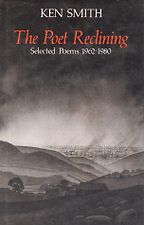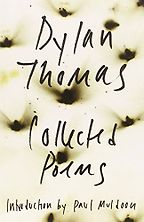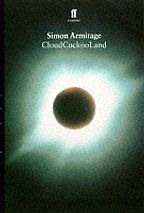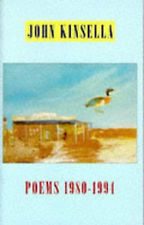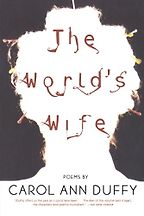I’ve never heard of Ken Smith, so please tell me about him.
I always like selected poems from a poet because it gives a good cross section of their psyche. I also like somebody in a nice shiny Bloodaxe book. When I was writing the poetry column for The Times for a couple of years, and I had to plough through reams and reams of books, I had to find two things: first, a poet I liked, and second, a poem I could actually write a little story about. One of the things I like about Ken Smith is that he tackles quite difficult subjects: people’s moods and people changing. There’s one I used for The Times called ‘The Son’, which describes how the presence of a boy has permeated every part of his parent’s lives: their home, their utensils, their memories, even as he has grown up and left home. Of course he comes back and he doesn’t recognise the person that they think he is. He is alien now and no longer belongs. Yet the essence of the child that he once was still lives on in the people who reared him. It’s quite specific and almost brutal. One of the things I like about certain poets is lack of fluff. I don’t like fluff – if you can use three words where ten will do, then why not use three words and avoid diluting the point of the piece? If you want fluff, buy a pillow.
Do you think it’s incredibly hard to pare down poetry?
It depends on the poem and the poet. Some people are more verbally economical by nature than others. Also everybody has a different voice and a different way of writing. But there are poets I’ve read who appear to have started a sentence and then become bogged down by adding several extraneous and unnecessary elements. And I think well, actually, that unadulterated sentence would have been quite sufficient and rather good. So the poets I have chosen are quite sparse in general terms, but not without humour – although Ken Smith’s poetry has a certain wistfulness about it, yet it’s very very strong. You could argue that it’s very masculine. His observations are specific and to the point; he doesn’t impose emotion on them. Some poets want you to use their own emotions and describe how sad or tragic or happy something is, as if to say, ‘I want you to feel this’. But I think it’s a much better idea to produce the evidence and have the reader find their own emotions for themselves. I would say Ken Smith is a very good poet to do that with. The selection covers 18 years and is hugely varied; I believe there is something in there for everyone.
Let’s look at the heavyweight Dylan Thomas.
Yes, let’s. I love a ‘collected poems’ because it gives you everything, so it’s very good value for money!
When you were a teenager, was he one of the poets you turned to first?
No, not particularly. I came to him quite late, actually. Again, one of the things I liked about him is I had been subjected, for various reasons, to a lot of lightweight namby-pamby poetry and it was just a joy to pick up a book where a poet was quite brutal and honed and expert. But also he’s lyrical; each poem lassos the reader and draws you in – no matter how long the poem, you want to read it to the end. He’s a musical joy and in comparison to the more modern poets I was reading at the time, he was a relief. He’s eloquent and a gentleman and each phrase is weighed for its purpose. He’s more verbally decorative than some of the other poets I have chosen; his poems are rich in thought and substance without diluting their purpose, whereas a lot of stuff that I come across is empty. ‘Do Not Go Gentle Into That Good Night’ has to be one of my favourite poems. He also wrote a poem ‘On a Wedding Anniversary’, a very short poem, which is deliciously sharp and brutal and makes the reader sit up and take notice.
Let’s move on to Simon Armitage’s CloudCuckooLand.
Armitage has an idiosyncratic view of the world and an extremely interesting way of delivering that view. He makes me think twice about almost everything he writes, and quite often there’s such a twist in his sense of humour, I find it irresistible. I love this: ‘Staring into a specimen cell of my own blood, I saw a microdot of my own face looking back up, I jumped away from the lens alarmed like a man who invented the telephone and suddenly it rang.’
It’s so fantastically random.
Yes, it is – and his imagery is unexpected, often in the extreme, and that makes you think, and that makes you look at things in a different way. One of the purposes of a poem is to take something mundane and look at it in another way so that it becomes interesting and the person reading the poem gets a different view of it, whereas before they might have passed it by.
Do you think you achieve that with your poetry?
I’d like to think so, because that’s why I write the poem. When I first write something, because a thought, or an idea, or a peculiar view pops into my head and I want to get it down, it becomes an irresistible itch that I have to scratch. Sometimes it works and sometimes it doesn’t, and when it works it’s very satisfying.
Five Books interviews are expensive to produce. If you're enjoying this interview, please support us by donating a small amount.
I could have chosen any other collection by Simon Armitage, but, when you like the voice of one poet, there’s not a lot they write that isn’t going to strike a chord with you. I think we gravitate towards poets who express themselves in the way we would like to express ourselves, if only we’d thought of it.
Don’t you think that sometimes we feel challenged by poets with voices that are very different from our own – and that that’s what makes them interesting?
I think it depends on the individual. There are some poets whose poetry doesn’t resonate with me, and I have to say I don’t find it challenging as a result; I find it tiresome. But then that’s just me. Then there are other poets about whose work I think, ‘This is marvellous; I didn’t think of this before; look at what he/she saw and the way he/she put it – my God, that’s wonderful, brilliant or very funny’. To be made to think has to be part of the process, otherwise we’re all…
Doomed?
Yes. Well put. The next book I’ve chosen is John Kinsella’s Poems 1980-1984. His poetry is often rooted in Australia and I lived in Australia for years.
Tell me about the Australian connection with John Kinsella.
I first met John Kinsella when he was interviewing me. He’s terrifyingly sharp and astute and poetically eloquent. He doesn’t miss anything, in his poetry or anyone else’s, and it was a rather terrifying interview on stage. I say terrifying as it was early on in my poetry-writing; I was reading some of my poetry, and he was interviewing me in front of an audience. I am always interested in how he writes about his past experiences, seeing them now in the context of his current life. When you read one of his poems, it’s like following a stream and you’re unavoidably swept along by the current. He takes you through his life in another country in a very accessible way, because even though Australia can be quite alien compared to us in wet, windy England, his Australia isn’t, because it’s his and he brings it to life for us. Of course, his poetry isn’t all about Australia; sometimes it’s about a bee or a ferret.
Is his poetry embedded in nature?
Yes, it is, but he’s also quite eclectic and he has a very open attitude to humans and humanity and our faults and failings. I look at poems like ‘Apprehension’ and want to read bits: ‘And how did you feel? The surface too close, the flutters fizzing at your tender and vulnerable feet loaded with misgiving’, and you already get a feeling of being naked and vulnerable, and then you want to know why, and on it goes… His poems are a little like roller-coaster rides.
Can his poems be unsettling like a roller-coaster?
Yes, he deals with some unsettling subjects, but then you have poems like the chilli poems. I have to mention the titles of some of the chilli poems because I find them very funny: ‘Archetypal Chillies’, ‘Chilli Catharsis’, ‘Hereditary Chillies’, ‘Transcendental Chillies’. He was growing chillies at the time. It’s taking reality and refining it, presenting it back at you and then making you laugh. I have a lot of admiration for this book, and also his sheer energy and output is quite extraordinary. He’s probably one of the most energetic people I have ever met. Everything in his life is material – even some things that other people might leave buried. He faces pretty much everything, it seems. Even chillies.
Let’s finish with Carol Ann Duffy’s The World’s Wife.
I love this book. I wrote a book called Waxworks based on mythological, biblical and historical characters. But what Carol Ann did was use their wives – wives like Mrs Faust, who refers to her husband as ‘an absolute berk’. She really doesn’t pull punches and she writes with a certain strength and mastery. She is a witty, intelligent, shocking yet compassionate writer with a rich source of imagery – I like to think this description applies to all the poets I have chosen. It’s funny and wicked and a great read. Mrs Aesop says her husband ‘could bore for purgatory’; Mrs Midas is cursed when her husband wishes for the golden touch and gets it. She moves him out – she cannot allow him to touch her. She visits from time to time as he starves, fish and hares turning to gold before he can eat them. Then she moves away. But thinks of him sometimes – she misses his touch. They’re irresistible poems.
Did your father give you any advice about writing poetry?
When I was a teenager, I occasionally asked my father for advice, but then I stopped at 17. At my 25-year school reunion at Bedales, I saw my old English teacher, John Batstone, and we were talking about the A-level English exam where you could hand in some of your own work in order to possibly increase your grade. He had a grim expression on his face and said: ‘There were 96 of them and all filled with teenage angst’ – referring to my poems!
Get the weekly Five Books newsletter
I was mostly too self-conscious to show my poems to my father. But the advice he did give me was: ‘Don’t worry about writing for anyone else’. However, just before I published my first book of poems, I simply gave him a huge pile of them and asked him to put them into good, bad and indifferent piles, without actually advising me on individual poems. I felt that if he told me anything about them then the re-writing wouldn’t be mine and I was adamant that the work be unadulterated. Although taking advice shouldn’t make a person feel the way that I did, in this case it was imperative. I cannot take credit for something I don’t feel I deserve credit for. So for me it has to be my own work, and that was my way of doing it. So Dad did as I asked and just put them in good, bad and indifferent piles.
Were you surprised by his choices?
No, I thought his choices were spot on.
What advice would you give a would-be poet?
I would advise people to read aloud. Especially emails – read them aloud and what you thought was humorous and witty will sound humourless and witless. For poetry, reading aloud is the single most important thing of all.
When you write a poem, do you walk up and down and say it aloud?
Absolutely. Over and over again, and it’s the only way that works. Then sometimes you have to put it down, walk away and leave it for a couple of days until it sounds like it’s not yours so that you can be more objective.
Do you begin a poem with an idea, phrase or image?
Often the driving force behind a poem is to hear something, see something or feel something that I really want to convey to other people or another person, where saying it in an ordinary way would not get the message through, and I want to make it somehow startling enough to catch their attention.
Have you ever felt you lost your voice as a poet?
No, but between the ages of 24 and 34 I didn’t write at all because I thought I’d get compared to my parents. I then got chronic fatigue when I was 34 and so I was only awake for 20 minute stretches for a total of about four hours a day, but I started writing poems because a) they were short, and b) I realised that I had refrained from writing poetry in order to avoid other people’s criticism and their comparison of me to my parents. But if I were on my deathbed, would I then think that was the right thing to do? I don’t think so. We can’t live to please others. Lots of people who aren’t going to read my poetry aren’t going to care. If people do compare me to my parents, then that’s taking the easy way out. As my father said: ‘You can only write for yourself’. If you live for what other people think of you, then you’re not living.
Interview by Rebecca Slack
Five Books aims to keep its book recommendations and interviews up to date. If you are the interviewee and would like to update your choice of books (or even just what you say about them) please email us at editor@fivebooks.com
